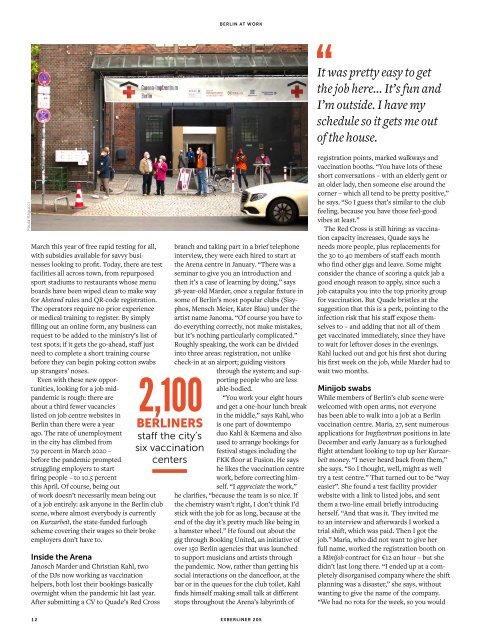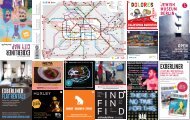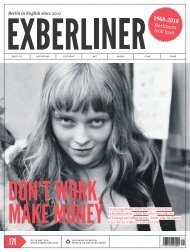EXB-205_Web
From test-driving delivery gigs to scoring work with corona and delving into the Nazi history of modern management, it’s all in a day’s work for Exberliner. Our latest issue explores jobs and jobbing in the city. FREE TO OBEY – A historian explains how an SS Oberführer shaped modern management THE CORONA GIG – A new job market grows out of testing and vaccinating – but how long will it last? COVID CAREER SHIFTS – Four hustlers find themselves at a professional crossroads SECURE IN THE SADDLE – Exberliner takes delivery app employers on a test drive “I’M A RIDER MYSELF!” – Gorillas start-up founder Kağan Sümer on how it all began COWORKING GOES CORPORATE – How big brands are warming to the idea of sharing an office THE HOMEOFFICE DEBATE – As the novelty wears off, we hear four different takes on working from home POLITICAL NOTEBOOK – Business as usual with Israel BEST OF BERLIN – A fashion Plattenbau, wine in a can and home-cooked grub to order BOOKS – The absurdity of Heimat, East German diaries and paperback picks BERLIN BITES – Four puffy-crusted gems of the pizza-demic SHORT ESCAPES – Venturing out to the sandy shores of the Müritz
From test-driving delivery gigs to scoring work with corona and delving into the Nazi history of modern management, it’s all in a day’s work for Exberliner. Our latest issue explores jobs and jobbing in the city.
FREE TO OBEY – A historian explains how an SS Oberführer shaped modern management
THE CORONA GIG – A new job market grows out of testing and vaccinating – but how long will it last?
COVID CAREER SHIFTS – Four hustlers find themselves at a professional crossroads
SECURE IN THE SADDLE – Exberliner takes delivery app employers on a test drive
“I’M A RIDER MYSELF!” – Gorillas start-up founder Kağan Sümer on how it all began
COWORKING GOES CORPORATE – How big brands are warming to the idea of sharing an office
THE HOMEOFFICE DEBATE – As the novelty wears off, we hear four different takes on working from home
POLITICAL NOTEBOOK – Business as usual with Israel
BEST OF BERLIN – A fashion Plattenbau, wine in a can and home-cooked grub to order
BOOKS – The absurdity of Heimat, East German diaries and paperback picks
BERLIN BITES – Four puffy-crusted gems of the pizza-demic
SHORT ESCAPES – Venturing out to the sandy shores of the Müritz
Create successful ePaper yourself
Turn your PDF publications into a flip-book with our unique Google optimized e-Paper software.
BERLIN AT WORK<br />
It was pretty easy to get<br />
the job here... It’s fun and<br />
I’m outside. I have my<br />
schedule so it gets me out<br />
of the house.<br />
Paula Ragucci<br />
March this year of free rapid testing for all,<br />
with subsidies available for savvy businesses<br />
looking to profit. Today, there are test<br />
facilities all across town, from repurposed<br />
sport stadiums to restaurants whose menu<br />
boards have been wiped clean to make way<br />
for Abstand rules and QR-code registration.<br />
The operators require no prior experience<br />
or medical training to register. By simply<br />
filling out an online form, any business can<br />
request to be added to the ministry’s list of<br />
test spots; if it gets the go-ahead, staff just<br />
need to complete a short training course<br />
before they can begin poking cotton swabs<br />
up strangers’ noses.<br />
Even with these new opportunities,<br />
looking for a job midpandemic<br />
is rough: there are<br />
about a third fewer vacancies<br />
listed on job centre websites in<br />
Berlin than there were a year<br />
ago. The rate of unemployment<br />
in the city has climbed from<br />
7.9 percent in March 2020 –<br />
before the pandemic prompted<br />
struggling employers to start<br />
firing people – to 10.5 percent<br />
this April. Of course, being out<br />
of work doesn’t necessarily mean being out<br />
of a job entirely: ask anyone in the Berlin club<br />
scene, where almost everybody is currently<br />
on Kurzarbeit, the state-funded furlough<br />
scheme covering their wages so their broke<br />
employers don’t have to.<br />
Inside the Arena<br />
Janosch Marder and Christian Kahl, two<br />
of the DJs now working as vaccination<br />
helpers, both lost their bookings basically<br />
overnight when the pandemic hit last year.<br />
After submitting a CV to Quade’s Red Cross<br />
2,100<br />
BERLINERS<br />
staff the city’s<br />
six vaccination<br />
centers<br />
branch and taking part in a brief telephone<br />
interview, they were each hired to start at<br />
the Arena centre in January. “There was a<br />
seminar to give you an introduction and<br />
then it’s a case of learning by doing,” says<br />
38-year-old Marder, once a regular fixture in<br />
some of Berlin’s most popular clubs (Sisyphos,<br />
Mensch Meier, Kater Blau) under the<br />
artist name Janoma. “Of course you have to<br />
do everything correctly, not make mistakes,<br />
but it’s nothing particularly complicated.”<br />
Roughly speaking, the work can be divided<br />
into three areas: registration, not unlike<br />
check-in at an airport; guiding visitors<br />
through the system; and supporting<br />
people who are less<br />
able-bodied.<br />
“You work your eight hours<br />
and get a one-hour lunch break<br />
in the middle,” says Kahl, who<br />
is one part of downtempo<br />
duo Kahl & Kæmena and also<br />
used to arrange bookings for<br />
festival stages including the<br />
FKK floor at Fusion. He says<br />
he likes the vaccination centre<br />
work, before correcting himself.<br />
“I appreciate the work,”<br />
he clarifies, “because the team is so nice. If<br />
the chemistry wasn’t right, I don’t think I’d<br />
stick with the job for as long, because at the<br />
end of the day it’s pretty much like being in<br />
a hamster wheel.” He found out about the<br />
gig through Booking United, an initiative of<br />
over 150 Berlin agencies that was launched<br />
to support musicians and artists through<br />
the pandemic. Now, rather than getting his<br />
social interactions on the dancefloor, at the<br />
bar or in the queues for the club toilet, Kahl<br />
finds himself making small talk at different<br />
stops throughout the Arena’s labyrinth of<br />
registration points, marked walkways and<br />
vaccination booths. “You have lots of these<br />
short conversations – with an elderly gent or<br />
an older lady, then someone else around the<br />
corner – which all tend to be pretty positive,”<br />
he says. “So I guess that’s similar to the club<br />
feeling, because you have those feel-good<br />
vibes at least.”<br />
The Red Cross is still hiring: as vaccination<br />
capacity increases, Quade says he<br />
needs more people, plus replacements for<br />
the 30 to 40 members of staff each month<br />
who find other gigs and leave. Some might<br />
consider the chance of scoring a quick jab a<br />
good enough reason to apply, since such a<br />
job catapults you into the top priority group<br />
for vaccination. But Quade bristles at the<br />
suggestion that this is a perk, pointing to the<br />
infection risk that his staff expose themselves<br />
to – and adding that not all of them<br />
get vaccinated immediately, since they have<br />
to wait for leftover doses in the evenings.<br />
Kahl lucked out and got his first shot during<br />
his first week on the job, while Marder had to<br />
wait two months.<br />
Minijob swabs<br />
While members of Berlin’s club scene were<br />
welcomed with open arms, not everyone<br />
has been able to walk into a job at a Berlin<br />
vaccination centre. Maria, 27, sent numerous<br />
applications for Impfzentrum positions in late<br />
December and early January as a furloughed<br />
flight attendant looking to top up her Kurzarbeit<br />
money. “I never heard back from them,”<br />
she says. “So I thought, well, might as well<br />
try a test centre.” That turned out to be “way<br />
easier”. She found a test facility provider<br />
website with a link to listed jobs, and sent<br />
them a two-line email briefly introducing<br />
herself. “And that was it. They invited me<br />
to an interview and afterwards I worked a<br />
trial shift, which was paid. Then I got the<br />
job.” Maria, who did not want to give her<br />
full name, worked the registration booth on<br />
a Minijob contract for €12 an hour – but she<br />
didn’t last long there. “I ended up at a completely<br />
disorganised company where the shift<br />
planning was a disaster,” she says, without<br />
wanting to give the name of the company.<br />
“We had no rota for the week, so you would<br />
12<br />
<strong>EXB</strong>ERLINER <strong>205</strong>


















